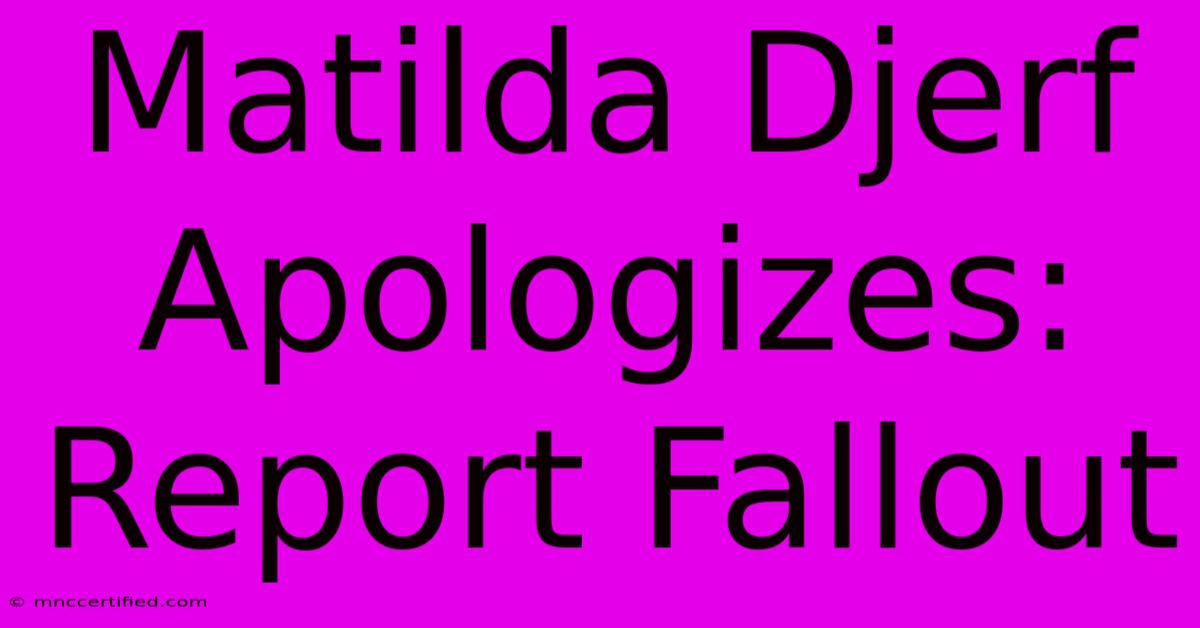Matilda Djerf Apologizes: Report Fallout

Table of Contents
Matilda Djerf Apologizes: Report Fallout and the Influencer Accountability Landscape
Matilda Djerf, the Swedish influencer with millions of followers across platforms like Instagram and TikTok, recently issued a public apology. This followed a report detailing allegations of problematic behavior, sparking a significant online conversation about influencer accountability and the impact of online personas. This article will delve into the details of the report, Djerf's response, and the broader implications for the influencer industry.
The Report's Allegations: What Sparked the Controversy?
The report, published by [Insert Publication Name Here – replace with actual publication if known, otherwise remove this sentence], alleged [Insert Specific Allegations Here – be precise but avoid defamation. For example: "unprofessional conduct towards employees," "misrepresentation of brand partnerships," or "inappropriate behavior on set." Replace with actual allegations if known, otherwise remove this section]. These allegations quickly gained traction, particularly among Djerf's dedicated fanbase and within the larger influencer community. The specifics of the report are crucial to understanding the subsequent apology and the ongoing discussion surrounding her actions. It's essential to note that these are allegations, and the truth may be subject to further investigation.
The Power of Online Influence and the Demand for Transparency
The influencer landscape thrives on trust and authenticity. When influencers build large and engaged followings, they wield considerable power, influencing purchasing decisions, lifestyle choices, and even social attitudes. This power comes with a responsibility for transparency and ethical conduct. The report highlighting allegations against Matilda Djerf underscores the crucial need for accountability within this industry. Any accusations of unethical behavior erode this trust and can have far-reaching consequences.
Matilda Djerf's Apology: A Calculated Response or Genuine Remorse?
Following the publication of the report, Matilda Djerf released a public apology [Link to apology if available, otherwise remove this sentence]. In her statement, she [Summarize Djerf's apology – mention specific points made. For example: "acknowledged the validity of some criticisms," "expressed regret for her actions," or "outlined steps she’s taking to improve"]. The sincerity of her apology is, however, subject to interpretation and continues to fuel the online debate.
Analyzing the Public Response: A Divided Opinion
The response to Djerf's apology has been mixed. Some followers have accepted her statement, expressing understanding and offering support. Others remain critical, questioning the authenticity of her remorse and calling for more substantial action. This division highlights the complexities of public perception and the difficulty of regaining trust after facing serious allegations.
The Broader Implications: Accountability in the Influencer Industry
This incident involving Matilda Djerf serves as a potent reminder of the ongoing need for greater accountability within the influencer industry. Many argue for stronger regulatory measures and increased transparency surrounding influencer marketing practices. The incident also underscores the importance of critical thinking among consumers, encouraging followers to approach online personas with a degree of healthy skepticism.
Moving Forward: Lessons Learned
The Matilda Djerf case highlights several key lessons:
- The importance of ethical conduct for influencers: Maintaining high ethical standards is paramount for long-term success and maintaining trust with followers.
- The power of social media scrutiny: Social media platforms can be powerful tools for holding influencers accountable for their actions.
- The need for transparency and open communication: Open communication with followers can help build trust and manage crises effectively.
- The evolution of influencer accountability: The industry needs to develop more robust mechanisms to ensure ethical behavior and protect both influencers and their audiences.
The fallout from the allegations against Matilda Djerf and her subsequent apology will undoubtedly continue to unfold. This incident serves as a crucial case study for the evolving influencer landscape, emphasizing the critical need for responsibility, transparency, and ethical conduct in the digital age. The discussion surrounding this case will likely shape future conversations about influencer accountability for years to come.

Thank you for visiting our website wich cover about Matilda Djerf Apologizes: Report Fallout. We hope the information provided has been useful to you. Feel free to contact us if you have any questions or need further assistance. See you next time and dont miss to bookmark.
Featured Posts
-
Kamaka Air Crash Fatal Accident
Dec 19, 2024
-
Nfl Player Mistaken For Bobbi Althoffs Boyfriend
Dec 19, 2024
-
Starting Xi Real Madrid Vs Pachuca Final
Dec 19, 2024
-
Mary Berry Life Love Loss And Net Worth
Dec 19, 2024
-
Mc Ilroy Scheffler Win 10 M Crypto Prize
Dec 19, 2024